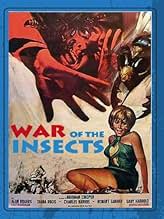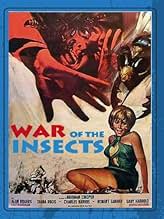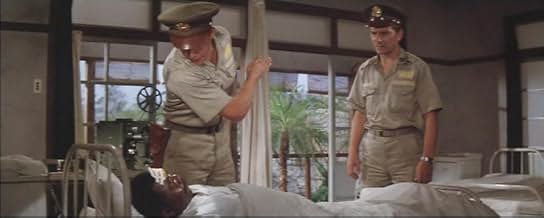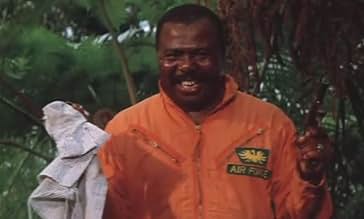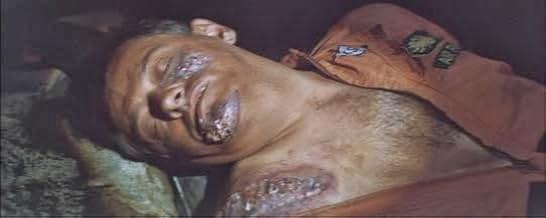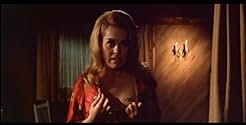Ajouter une intrigue dans votre langueAll the insects on Earth become wild and attack humans, causing Armageddon.All the insects on Earth become wild and attack humans, causing Armageddon.All the insects on Earth become wild and attack humans, causing Armageddon.
- Réalisation
- Scénario
- Casting principal
Ralph Jesser
- Lieutenant Gordon
- (as Rolf Jesser)
Mike Danning
- Aircraft Captain
- (as Mike Daneen)
Avis à la une
Let's not beat around the bush: this is a mess. It's not all bad, but a bounty of good ideas are fumbled terribly in too many ways. We do get the variation on "nature run amok" genre cinema that is promised by the very name of 'War on the insects,' and the alternate name 'Genocide,' but this is delayed, sidelined, and scarcely more than alluded to for a majority of the runtime, only slowly becoming more central in the latter half. This might be fine if the storytelling at large were strong and compelling, but the thriller-orientated human drama that defines the preponderance is garbled and scattered, with all its very workable notions being treated questionably if not outright poorly. To wit: a U. S. Air Force bomber, a murder investigation, and the suspect's expecting wife; U. S. airmen, Soviet spies, the Cold War, and hatred of war and humans; and to top it all off, nihilist, misanthropic biological warfare, experimentation, and eco-terrorist supremacy. Amada Kingen penned a fine story with engaging thoughts, admirable themes, and bleak despair. Screenwriter Takaku Susumu took that story and devised a screenplay that's far more heavy-handed than his work for another contemporary Shochiku horror piece, 'Goke, body snatcher from hell,' and frankly downright sloppy and harried. The film isn't downright awful, but that's not saying much.
For as gawky as the screenplay is, plot development is commonly brusque and forced, and the pacing is a mixed bag that mostly, increasingly, pushes along too swiftly. The narrative at large feels overfull in only eight-four minutes as ideas are smashed together inelegantly; swell as the root conceptions for characters, scenes, and dialogue may be, they are reduced and rendered with such blunt, tactless forthrightness that their potential is overcooked. Add some Movie Magic for good measure, moving the plot along as it requires without concern for judicious, sensible story progression. To much the same end, while he could only work with the material he had, Nihonmatsu Kazui's direction here comes across as harried, struggling to keep the proceedings cohesive - which makes it all the more unfortunate that Terada Akimitsu's editing is even more curt and forcible than the plot development, so dubious that at times a beat or scene is altogether cut short. For the record, that includes the last minutes. And it bears repeating that all throughout the length we're given spoken reference to insect activity, but it's certainly not handled in a manner that allows the thought to resonate; in the second half these thoughts are brought to bear more concretely, but still the potency is plainly lacking owing to how the picture was written, directed, and edited.
Other facets are more appreciable. Under all these conditions the cast is regularly put in the regrettable position of overacting (I feel so bad for Chico Roland in particular), recalling contemporary 'Star Trek,' but they put forth an honest effort and mostly come off better than not. Hirase Shizuo's cinematography is fairly smart at times, capturing some nice detail. I love the stunts and practical effects, of course, and the special makeup; where more fanciful visuals are inserted the use is quite fetching. The production design and art direction are fantastic, and likewise the costume design, hair, and makeup. I like Kikuchi Shinsuke's original music as it complements the proceedings, even if it tends to get overwhelmed by all else on hand. Broadly speaking 'War of the insects' is well made. It's just that for all the skill and intelligence that did go into it, these are sadly not reflected in the writing, the direction, or the editing, and the end product stumbles significantly in imparting its tale. We do get what we came for, but the power of the material absolutely is not there. I tend to refer to Fukasaku Kinji's 'Virus' of 1980 a lot because it has stuck with me every day since I watched it, but it seems like a particularly relevant point of comparison here: while the plots differ, the features reach for the same region of tying together an apocalyptic nightmare, the shortsightedness of humans and military endeavors, and the faint spark of hope for a future. Where 'Virus' resonates thunderously over its two and one-half hours, however, the doing here is such a clunky mishmash that it is robbed of all impact.
It's not all bad. There are much worse ways to spend your time. For what this title does well, I want to like it more than I do. For all those ways in which it falls short, emphatically including the almost laughable last stretch, I wonder if I'm not being too generous. I'm glad for those who get more out of 'War of the insects' than I do, but in my opinion this is just too flawed to earn a specific recommendation.
For as gawky as the screenplay is, plot development is commonly brusque and forced, and the pacing is a mixed bag that mostly, increasingly, pushes along too swiftly. The narrative at large feels overfull in only eight-four minutes as ideas are smashed together inelegantly; swell as the root conceptions for characters, scenes, and dialogue may be, they are reduced and rendered with such blunt, tactless forthrightness that their potential is overcooked. Add some Movie Magic for good measure, moving the plot along as it requires without concern for judicious, sensible story progression. To much the same end, while he could only work with the material he had, Nihonmatsu Kazui's direction here comes across as harried, struggling to keep the proceedings cohesive - which makes it all the more unfortunate that Terada Akimitsu's editing is even more curt and forcible than the plot development, so dubious that at times a beat or scene is altogether cut short. For the record, that includes the last minutes. And it bears repeating that all throughout the length we're given spoken reference to insect activity, but it's certainly not handled in a manner that allows the thought to resonate; in the second half these thoughts are brought to bear more concretely, but still the potency is plainly lacking owing to how the picture was written, directed, and edited.
Other facets are more appreciable. Under all these conditions the cast is regularly put in the regrettable position of overacting (I feel so bad for Chico Roland in particular), recalling contemporary 'Star Trek,' but they put forth an honest effort and mostly come off better than not. Hirase Shizuo's cinematography is fairly smart at times, capturing some nice detail. I love the stunts and practical effects, of course, and the special makeup; where more fanciful visuals are inserted the use is quite fetching. The production design and art direction are fantastic, and likewise the costume design, hair, and makeup. I like Kikuchi Shinsuke's original music as it complements the proceedings, even if it tends to get overwhelmed by all else on hand. Broadly speaking 'War of the insects' is well made. It's just that for all the skill and intelligence that did go into it, these are sadly not reflected in the writing, the direction, or the editing, and the end product stumbles significantly in imparting its tale. We do get what we came for, but the power of the material absolutely is not there. I tend to refer to Fukasaku Kinji's 'Virus' of 1980 a lot because it has stuck with me every day since I watched it, but it seems like a particularly relevant point of comparison here: while the plots differ, the features reach for the same region of tying together an apocalyptic nightmare, the shortsightedness of humans and military endeavors, and the faint spark of hope for a future. Where 'Virus' resonates thunderously over its two and one-half hours, however, the doing here is such a clunky mishmash that it is robbed of all impact.
It's not all bad. There are much worse ways to spend your time. For what this title does well, I want to like it more than I do. For all those ways in which it falls short, emphatically including the almost laughable last stretch, I wonder if I'm not being too generous. I'm glad for those who get more out of 'War of the insects' than I do, but in my opinion this is just too flawed to earn a specific recommendation.
All the insects on Earth become wild and attack humans, causing Armageddon.
The film's staff includes Shizuo Hirase as the cinematographer, who also worked on the Shochiku films "The X from Outer Space" and "Goke, Body Snatcher from Hell". Composer Shunsuke Kikuchi, who also worked on "Goke", does the music here; he may be best known today for "Female Convict Scorpion" or perhaps "Dragon Ball Z".
Because this was the last horror film Shochiku would produce, it is suitably ambitious and apocalyptic. This is dark, bleak, and edgy beyond what we typically see from horror of the era, especially in Japan. We (at least Americans) expect men in rubber suits to beat on each other, but this is a far worse menace!
The film's staff includes Shizuo Hirase as the cinematographer, who also worked on the Shochiku films "The X from Outer Space" and "Goke, Body Snatcher from Hell". Composer Shunsuke Kikuchi, who also worked on "Goke", does the music here; he may be best known today for "Female Convict Scorpion" or perhaps "Dragon Ball Z".
Because this was the last horror film Shochiku would produce, it is suitably ambitious and apocalyptic. This is dark, bleak, and edgy beyond what we typically see from horror of the era, especially in Japan. We (at least Americans) expect men in rubber suits to beat on each other, but this is a far worse menace!
This time, the insects trying to destroy humanity aren't giant ones. It's all of them, though, which is worse.
Like most well-made science fiction movies, this has a strong symbolic component, rendering it a fable or parable. Here, the thought is that mankind is being destroyed by its inability to communicate and thus cooperate. American soldiers are looking for "Eastern bloc" spies, and try to find a lost H-bomb without anyone finding out; the blonde lady who's using the insects hates people; a girl thinks of having an abortion, because she doesn't know that her lover wants it.
Some characters can't be found, some won't talk, resulting in a solution being impossible to arrive at. Normally I would call this idiot plotting, a problem that wouldn't be a problem if people talked. Here, that's the point of this movie: problems are caused by people not talking.
Like most well-made science fiction movies, this has a strong symbolic component, rendering it a fable or parable. Here, the thought is that mankind is being destroyed by its inability to communicate and thus cooperate. American soldiers are looking for "Eastern bloc" spies, and try to find a lost H-bomb without anyone finding out; the blonde lady who's using the insects hates people; a girl thinks of having an abortion, because she doesn't know that her lover wants it.
Some characters can't be found, some won't talk, resulting in a solution being impossible to arrive at. Normally I would call this idiot plotting, a problem that wouldn't be a problem if people talked. Here, that's the point of this movie: problems are caused by people not talking.
Maybe if the bugs had been big and/or radioactive, we could have had some fun set pieces, but eventually it sets in that maybe this doesn't want to be a fun, silly bug movie.
I mean, the premise of insects wanting to wipe out humanity before humanity wipes them out is absurd, but through this crazy premise, the film gets pretty serious, thematically, while looking at things like the atomic bomb attacks on Japan and the Holocaust, which must given this its title of Genocide.
Not sure I've ever had a B-movie like this go so heavy (especially when at the start it looked like it was going to be very silly), and I don't think it truly works, but it's an admirable effort.
It will surely stick out in my memory the more and more old Japanese horror movies I work through in the future.
I mean, the premise of insects wanting to wipe out humanity before humanity wipes them out is absurd, but through this crazy premise, the film gets pretty serious, thematically, while looking at things like the atomic bomb attacks on Japan and the Holocaust, which must given this its title of Genocide.
Not sure I've ever had a B-movie like this go so heavy (especially when at the start it looked like it was going to be very silly), and I don't think it truly works, but it's an admirable effort.
It will surely stick out in my memory the more and more old Japanese horror movies I work through in the future.
Exceptionally convoluted and deliriously nihilistic, Genocide is appropriately harrowing and periodically bonkers if a little middling around the second act. The second of only two movies from director Kazui Nihonmatsu, having previously helmed The X from Outer Space, Genocide is all over the place with enough hair-brained ideas to fill two movies let alone a single 84-minute one, primarily the hallucinogenic bees being bred by an insane holocaust survivor. Nihonmatsu handles the film with considerably more skill than his prior effort, there's a wider variety of shots and a better building of suspense thanks in part to the photography of Shizuo Hirase and the passable score from Shunsuke Kikuchi. It's very much an accident of a film, suitably ambitious and apocalyptic in its finality, ultimately hinging on the potential detonation of a hydrogen bomb and the single mother who may have to single-handedly repopulate a country. Genocide is an exhausting yet very rewarding experience, showcasing so pretty damn good filmmaking for its small budget but, as noted before, has too much plot for its own good.
Le saviez-vous
- AnecdotesThe film received the comedic riff treatment by the Mystery Science Theater 3000 (1988) crew in "Cinematic Titanic" under its original U.S. title "War of the Insects".
- ConnexionsFeatured in Cinematic Titanic: War of the Insects (2011)
Meilleurs choix
Connectez-vous pour évaluer et suivre la liste de favoris afin de recevoir des recommandations personnalisées
- How long is Genocide?Alimenté par Alexa
Détails
- Date de sortie
- Pays d’origine
- Langue
- Aussi connu sous le nom de
- War of the Insects
- Société de production
- Voir plus de crédits d'entreprise sur IMDbPro
- Durée1 heure 24 minutes
- Mixage
- Rapport de forme
- 2.45 : 1
Contribuer à cette page
Suggérer une modification ou ajouter du contenu manquant

Lacune principale
By what name was Konchû daisensô (1968) officially released in India in English?
Répondre
